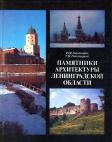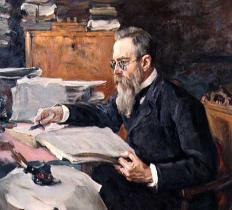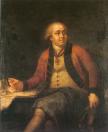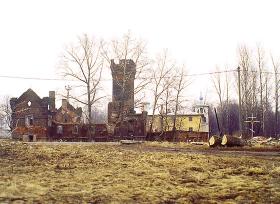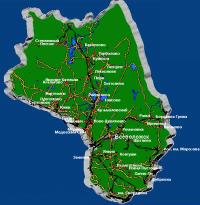Articles
/
Ostrovki, a country estate
Ostrovki, a country estate
Subject /
Architecture/Country estates
Ostrovki, an estate (the village of Ostrovki, the Vsevolozhsk District), is situated on the right bank of the Neva River. From 1777 the country house belonged to Prince G.A. Potymkin - Tavrichesky. The Palace (it was built in 1784 - 1786 according the project of the architect I.E. Starov) was located on a lofty artificial mound. It included five different shapes and high towers that created an image of a medieval castle-house. From three quarters the spacious park with ponds and hothouses adjoined to the palace. The park is supposed to be laid out according the plan of I.E. Starov and with participation of the English gardener William Guld. The main park's landmarks became the small islands which were made in a band of the River Neva. They gave the name to the estate. In the first half of the 19th century the estate was belonged to Lieutenant-General P.N. Choglokov and his inheritors, from 1885 it was belonged to the merchant I.M. Oleynikov. Separate apartments of the palace were leased to summer residents. In 1875 the composer N.A. Rimsky-Korsakov lived there. A.A. Rylov worked at sketches in Ostrovki in winter of 1916. During the World War II the palace and park were ruined. Only the foundation and a part of a wall were preserved.
Authors
Chekanova, Olga Aleksandrovna
Persons
Choglokov, Pavel Nikolayevich
Guld, William
Oleynikov, I.M.
Potemkin, Grigory Aleksandrovich, Highness Prince of Taurida
Rimsky-Korsakov, Nikolay Andreyevich
Rylov, Arkady Aleksandrovich
Starov, Ivan Yegorovich
Geography
Topographical landmarks/Neva River, the
Leningrad Oblast, the/Vsevolozhsk District/Ostrovki Village
Bibliography
Кючарианц Д.А. Иван Старов. Л., 1982.
Мурашова Н.В. Сто дворянских усадеб Санкт-Петербургской губернии: Исторический справочник. СПб., 2005., 234-236
Mentioned in articles:
|
hidden
|
Protection of monuments of history and culture
The protection of history and culture monuments. Issues of the monuments protection are germane to the degree of their studying, right description and fixing. In Russia, the beginnings of interest in monuments of native antiquity were reflected in... more
|
|
|
|
hidden
|
Rimsky-Korsakov, Nikolay Andreyevich (1844-1908), a musician
RIMSKY-KORSAKOV, Nikolay Andreyevich (1844, Tikhvin Town - 1908, Lyubensk estate S.-Petersburg Gubernia), composer, teacher, conductor, public figure. In 1862 Rimsky-Korsakov graduated from the Navy military school, until 1865 he served on board... more
|
|
|
|
hidden
|
Shubin, Fedot Ivanovich (1740 - 1805), a sculptor
SHUBIN (SHUBNOY), Fyodot Ivanovich (1740–1805), a sculptor. He lived in St.Petersburg since 1759. In the period 1761-67 he studied at the Academy of Fine Arts, his teacher was H.F. Gillet. Shubin lived in Paris (1767-70) and in Rome (1770-72)... more
|
|
|
|
hidden
|
Starov, Ivan Yegorovich (1745 - 1808), an architect
Ivan Yegorovich Starov (1745 - 1808), an architect, a founder of the Russian classicism style. He learned at the St.Petersburg Academy of Arts, continued the education in France and Italy. In 1769 Starov became an academician and from 1794 he... more
|
|
|
|
hidden
|
Urban settlement named after Sverdlov
NAMED AFTER SVERDLOV, an urban settlement in Vsevolozhsk District. Population: 9,200. It situated on the Neva’s right bank, downstream of the Ivanovsky Rapids. Named after Y. M. Sverdlov, a Bolshevik revolutionary. It was given the status of a... more
|
|
|
|
hidden
|
Vsevolozhsk District
VSEVOLOZHSK DISTRICT, a part of Leningrad Oblast. Area: 2945.4 sq. km. Population: 215,200. Adm. center: Vsevolozhsk Town. Comprises Sertolovo Town, six urban settlements (Dubrovka, settlement named after Morozov, settlement named after Sverdlov,... more
|
|
|
|








